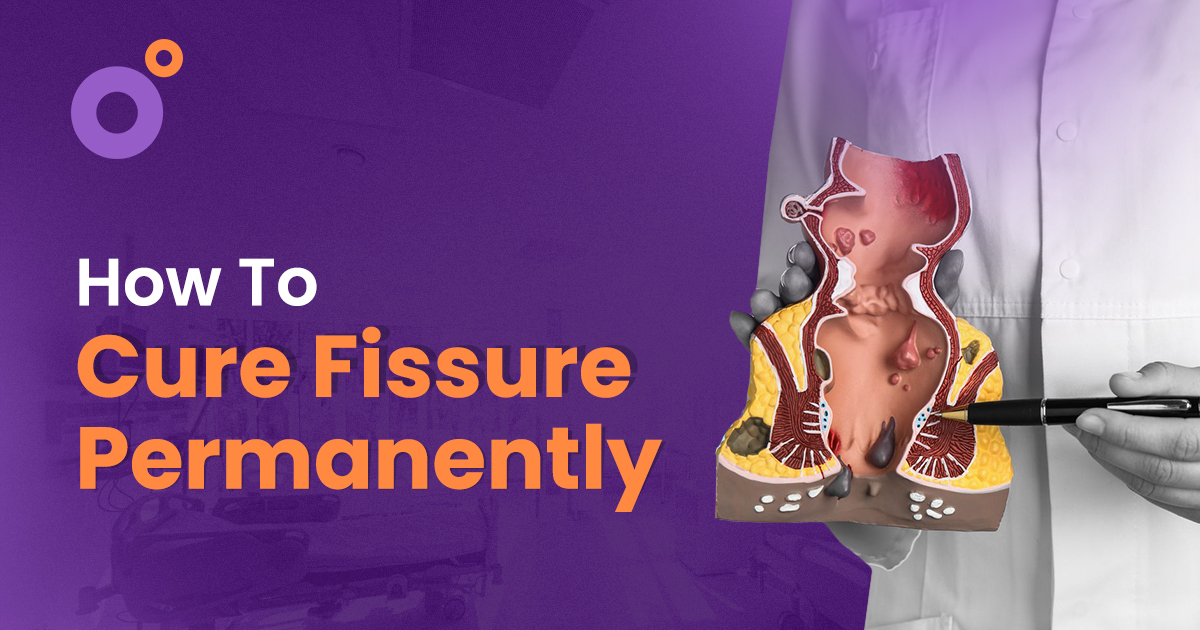
How to Cure Fissure Permanently
Medically reviewed by

Dr. Shudhhatam Jain
MBBS, DNB - General Surgery
Introduction
Anal fissures refer to the ruptures or tears that occur in the junction of the anal canal and the last part of the colon, through which stools pass out of the body. Common fissure symptoms associated with bowel movements include itching, bleeding, and pain. While small fissures that cause pain can sometimes heal independently, deeper and chronic fissures may require medical intervention.
Although anal fissure symptoms are more commonly observed in infants and children, they can affect individuals of any age. Typically, these fissures heal within a span of four to six weeks. However, if the fissure fails to heal within this timeframe, it may become chronic, necessitating medical or laser surgical fissure treatment for its resolution.
Causes of Anal Fissure
The cause of anal fissures is often related to trauma in the anal canal. These tears or ruptures of the rectum can occur in individuals of any age, although they are more commonly observed in younger and healthier individuals. The development of anal stenosis is usually attributed to the pressure exerted on the anal cavity, which can be caused by prolonged sitting, stress, or having a high-pressure job. Simple fractures are the most common type of primary fissure.
Anal fissure symptoms can arise from severe constipation or undue strain on the muscles encompassing the anal canal, like extended periods of sitting in day-to-day routines. They can also occur during or after childbirth, especially following a challenging delivery. While it was previously thought that most fissures were a result of straining while passing stools, we now understand that the tone of the sphincter muscle can contribute to chronic fissures.
How To Cure Fissure Permanently?
Stool Softener
When it comes to relieving constipation, one commonly suggested approach is the utilization of stool softeners. It's important to note that stool softeners differ from laxatives and are generally regarded as safe options. Although they tend to have minimal side effects, it is still advisable to consult with a healthcare professional before incorporating them into your routine. These agents increase water absorption into the digestive tract or intestines, resulting in softer stools.
Fibre Supplement
If your diet lacks an adequate amount of fibre, incorporating a fibre supplement can prove advantageous. There are several types of fibre supplements to choose from, with popular ingredients including psyllium husk, methylcellulose, and polycarbophil.
Sitz Bath
Sitz baths involve sitting in lukewarm water in a bathtub, which can provide pain relief and alleviate discomfort. However, it may not expedite the healing of an anal fissure. Sitz baths can be purchased from local drugstores or online platforms. They are typically made of plastic and should be used by filling them with water. Sitting in the bath for 10 to 15 minutes is generally recommended, preferably 2-3 times daily.
Maintain Bathroom Hygiene
Ensure proper bathroom hygiene by gently cleaning the area around the anus after each bowel movement and thoroughly drying it. It is essential not to ignore the urge to defecate, as suppressing it can worsen the fissure. Avoid using soap or bubble baths, as they can irritate the skin in the anal canal. Additionally, be mindful of excessive or prolonged sitting on the toilet, as it can exert extra pressure on the anal area.
Stay Well-Hydrated
The key to preventing constipation is to stay hydrated. Drinking enough water makes it easier to pass soft stools. Incorporating foods with high water content can improve your overall hydration goals.
Laser Surgery
In cases where other fissure treatment has been ineffective or when symptoms are severe, your healthcare provider may recommend surgery for a chronic anal fissure. The most common surgical procedure is laser surgery.
This technique helps promote healing, reduce spasms, and alleviate pain. Research indicates that laser surgery is significantly more effective than any other medical fissure treatment.
Final Words
Medical facilities offer non-surgical fissure treatment that are readily accessible. Both medications and laser surgeries are also readily available. If you seek the most effective treatment options for anal fissures, consider visiting FirstCure Health. FirstCure provides top-notch consultations specifically tailored to anal fissures. Don't hesitate to make your appointment today!
Why talk to Us?
We at FirstCure have top doctors equipped with most advanced procedures at guranteed lowest cost. We will assist you at every step from booking consultations, second opinions, arranging diagnostic tests, insurance approvals and related paperwork, admission to discharge and post surgery follow up consultation.